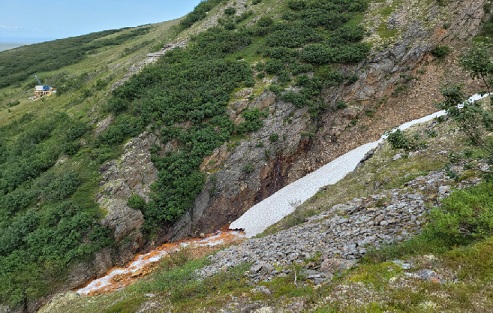by WorldTribune Staff, November 19, 2025 Real World News
The U.S. remains 93% dependent on imports for vital rare earth minerals, with China dominating the mining and processing of the minerals, controlling approximately 70% of global mining and over 85% of processing capacity.
A new discovery of rare earths in Alaska could cut into China’s dominance, industry insiders are saying.

Early tests from Alaska’s Graphite Creek deposit near Nome reveal concentrations of neodymium, praseodymium, terbium, and dysprosium—crucial for high-tech applications, according to a Nov. 19 analysis by Astrid Callahan for the America First Report.
Graphite One Inc., the company behind the project, recently confirmed the rare earths are embedded in garnet-bearing rock at the site, already known as the largest graphite reserve in the country.
“The presence of rare earths at Graphite Creek suggests that recovery as a by-product to our graphite production will maximize the value,” the company said.
The Alaska deposit “qualifies under the Defense Production Act, signaling its role in bolstering domestic security,” Callahan wrote.
Alaska Gov. Mike Dunleavy spotlighted the project in his State of the State address, pushing for swift progress with backing from state and federal levels.
“Policies under President Donald Trump have sped up such efforts, prioritizing American soil for critical resources and cutting red tape that once stalled exploration,” Callahan wrote.
Callahan concluded:
Tapping Graphite Creek means more than jobs in Alaska—it rebuilds U.S. supply chains from the ground up. Domestic mining and refining would shield against bans or manipulations, fostering investor trust and industrial growth. With processing plants eyed for states like Ohio, the full chain stays on home turf, echoing what China has mastered but now within reach for America.
Similar veins have turned up elsewhere, like in Pennsylvania’s old coal fields where up to 17 rare earths lurk in wastewater and ash. Pilot programs there, kickstarted years ago, hint at broader potential. Yet Alaska’s scale stands out, especially amid whispers that foreign interests have long worked to keep such sites underdeveloped through regulatory hurdles or market flooding.
In the end, securing these resources bolsters everything from energy independence to defense readiness. Nations that lock down their own supplies don’t wait on others’ whims—they forge ahead. Alaska’s find opens that door, positioning the U.S. to reclaim leadership in a field too vital to outsource.
Support Free Press Foundation
